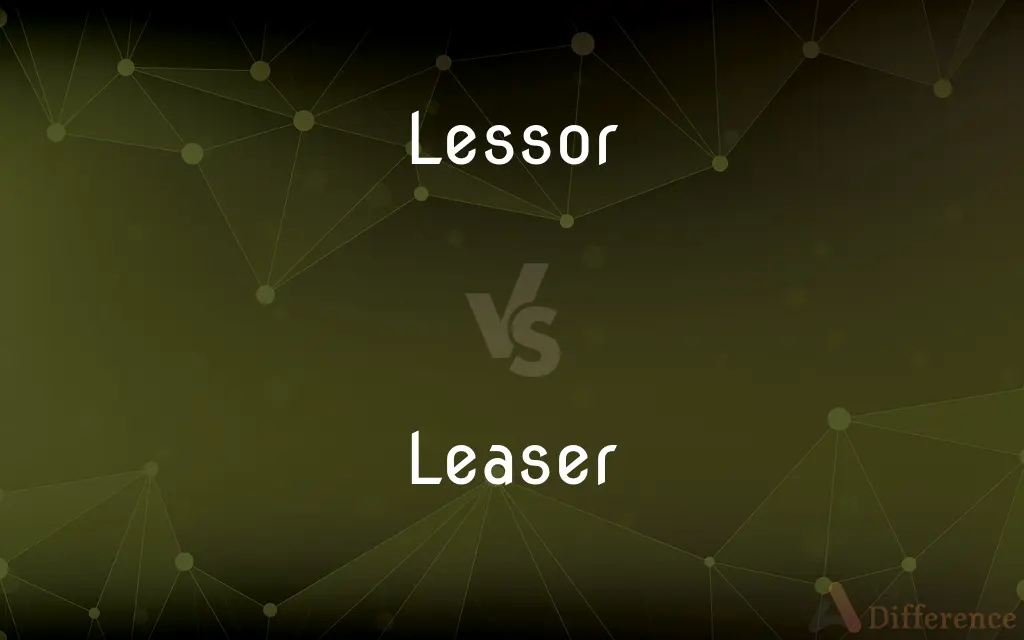Lessor vs. Leaser — What's the Difference?
By Tayyaba Rehman & Fiza Rafique — Updated on March 30, 2024
The lessor grants property for use, while the leaser obtains property to use.

Difference Between Lessor and Leaser
Table of Contents
ADVERTISEMENT
Key Differences
A lessor is an individual or entity that owns a property or asset and agrees to lease it out to another party, providing them with the right to use the property for a specified period under certain conditions. On the other hand, a leaser, often referred to as a lessee, is the party that obtains the right to use this property or asset from the lessor by entering into a lease agreement.
While the lessor retains ownership of the property, the leaser gains the right to use it, typically in exchange for regular payments to the lessor. This relationship is governed by a lease agreement, which outlines the terms and conditions of the lease, including the duration, payment schedule, and responsibilities of each party.
One of the key differences between the two is their position in the lease agreement: the lessor is the supplier of the asset, whereas the leaser is the recipient. This distinction determines their respective rights and obligations under the lease.
Furthermore, the financial responsibilities of the lessor and leaser differ. The lessor may be responsible for property taxes, insurance, and maintenance, depending on the lease terms. Meanwhile, the leaser is generally responsible for the lease payments and, in some cases, certain maintenance costs.
Lastly, at the end of the lease term, the lessor expects the property to be returned in a condition specified by the lease agreement, whereas the leaser must comply with these conditions to avoid penalties or additional fees.
ADVERTISEMENT
Comparison Chart
Definition
Owns property and grants its use to another.
Obtains the right to use property from the owner.
Role in Lease Agreement
Supplier of the asset.
Recipient of the asset's use.
Financial Responsibility
Often responsible for taxes, insurance, and major maintenance.
Responsible for lease payments and sometimes minor maintenance.
Legal Obligations
Must ensure the property is usable and meets certain standards.
Must use the property according to the lease terms.
End of Lease Term
Expects the property back as agreed.
Must return the property or renew the lease.
Compare with Definitions
Lessor
An individual or entity that leases out property.
The lessor received monthly payments for the apartment.
Leaser
A person or company that leases an asset from another.
The leaser paid the first month's rent and security deposit.
Lessor
Owner of a property who enters a lease agreement.
The lessor agreed to fix the plumbing issues.
Leaser
Party in a lease agreement with the right to use property.
As the leaser, he was responsible for minor repairs.
Lessor
Party in a lease agreement granting use of an asset.
The lessor provided the car for a two-year lease.
Leaser
Typically responsible for the lease payments.
The leaser set up automatic monthly payments.
Lessor
Has the right to reclaim the property after the lease term.
The lessor inspected the apartment at the lease’s end.
Leaser
Must return the property at the end of the lease.
The leaser cleaned the apartment thoroughly before moving out.
Lessor
Responsible for the property’s overarching maintenance.
As the lessor, she ensured the building met safety regulations.
Leaser
Obligated to follow the terms set in the lease agreement.
The leaser could not sublet the apartment without approval.
Lessor
One who leases property; a landlord.
Leaser
A contract granting use or occupation of property during a specified period in exchange for a specified rent or other form of payment.
Lessor
(property law) The owner of property that is leased; the landlord to a lease.
Leaser
The term or duration of such a contract.
Lessor
One who leases; the person who lets to farm, or gives a lease.
Leaser
To grant use or occupation of under the terms of a contract.
Lessor
Someone who grants a lease
Leaser
To get or hold by such a contract.
Leaser
(nonstandard) One who leases or gleans; lessor.
The owner of the property is the leaser when they rent it by lease to a lessee.
Leaser
Leaseman.
Leaser
One who leases or gleans.
Leaser
A liar.
Common Curiosities
How does a lease agreement benefit a lessor?
It provides the lessor with a steady income stream while retaining property ownership.
Who is a lessor?
A lessor is the owner of a property or asset who leases it out to another party under a lease agreement.
Are leasers responsible for property maintenance?
Leasers are typically responsible for minor maintenance and upkeep, while major repairs and maintenance are the lessor's responsibility, unless otherwise stated in the lease.
What happens if a leaser damages the property?
The leaser may be responsible for repair costs and could face additional penalties as specified in the lease agreement.
What is a leaser?
A leaser, or lessee, is an individual or entity that obtains the right to use a property or asset from a lessor for a specified time under agreed terms.
What rights does a leaser have?
A leaser has the right to use the property as agreed in the lease, subject to the terms and conditions outlined therein.
Can a lessor increase the rent during the lease period?
Rent increases during the lease term are typically not allowed unless specifically allowed by the lease terms.
Do leasers have the option to buy the property?
In some lease agreements, such as lease-to-own contracts, leasers may have an option to purchase the property.
Can a lessor end the lease early?
Yes, a lessor can end the lease early if the leaser violates the lease terms, depending on the agreement's conditions.
Is a security deposit always required from a leaser?
While common, it depends on the lease agreement and the lessor's requirements.
Can a leaser sublet the property?
Subletting depends on the lease agreement’s terms; it’s often allowed with the lessor's permission.
What is the difference between a lease and a rental agreement?
Leases typically cover longer periods and have fixed terms, while rental agreements may be more flexible and cover shorter durations.
What is a typical lease term?
Lease terms vary widely, from short-term leases (months) to long-term leases (several years).
Are lease payments tax-deductible for leasers?
For business leases, payments may be deductible as business expenses, but this can vary based on local laws and the lease's nature.
What happens at the end of a lease term?
The leaser usually returns the property to the lessor, unless the lease is renewed or the property is purchased if such an option exists.
Share Your Discovery

Previous Comparison
Travelled vs. Traveled
Next Comparison
Questionnaire vs. QuestionAuthor Spotlight
Written by
Tayyaba RehmanTayyaba Rehman is a distinguished writer, currently serving as a primary contributor to askdifference.com. As a researcher in semantics and etymology, Tayyaba's passion for the complexity of languages and their distinctions has found a perfect home on the platform. Tayyaba delves into the intricacies of language, distinguishing between commonly confused words and phrases, thereby providing clarity for readers worldwide.
Co-written by
Fiza RafiqueFiza Rafique is a skilled content writer at AskDifference.com, where she meticulously refines and enhances written pieces. Drawing from her vast editorial expertise, Fiza ensures clarity, accuracy, and precision in every article. Passionate about language, she continually seeks to elevate the quality of content for readers worldwide.













































